If you want to transform your physique, it's crucial to push yourself during every workout. High-intensity training can help you get bigger, stronger, faster—whatever the goal. But, when we exert ourselves with the type of intense training required to produce head-turning results, our bodies have mechanisms that trigger fatigue. Not only is it an evolutionary response to protect us from the stress of intense physical exertion, but it's also a sign that the fuel tank is empty. While it's natural for energy levels to drop as a workout progresses, there are key factors contributing to fatigue during a workout—and some things you can do to fight it.
Hydrogen Buildup
During a workout, the body uses different substrates as fuel. For high-intensity exercise such as a CrossFit WOD or dropsets during a bodybuilding workout, near-maximal efforts are required, and acidosis within muscle tissue is often a limiting factor. You know that feeling when you're knee-deep in a high-rep set and it becomes difficult to crank out those last few reps because your muscles feel like they're on fire? That burning sensation is the buildup of hydrogen and other byproducts in your muscle.

Glucose is the go-to fuel source for high-intensity training because the body can quickly break it down and convert it to adenosine triphosphate (ATP). The breakdown of glucose, a process known as glycolysis, generates compounds such as carbon dioxide and hydrogen as byproducts. As hydrogen ions accumulate, the pH levels in the body are altered, which results in a more acidic environment. The higher body pH affects overall performance by altering the muscles' ability to contract, causing fatigue. For athletes who push their training to the limit, excessive hydrogen buildup can be one of the reasons their workouts are cut short.
Fortunately, the body has built-in systems that work to maintain balance and neutralize the acid buildup. One of these molecules is carnosine, a dipeptide made up of the amino acids histidine and beta-alanine. Carnosine helps increase the muscle's pH by buffering hydrogen ions, allowing for better overall muscle function. Interestingly, research has shown that the concentration of histidine in the body is ample, and it's the beta-alanine that appears to be the amino acid limiting the synthesis of carnosine.[1] Scientists have theorized that carnosine synthesis can be elevated by increasing beta-alanine consumption, and, in fact, beta-alanine supplementation has been shown to improve exercise performance lasting 60-240 seconds when a median total of 179 grams is consumed over the course of several weeks.[2]
The Fatigue Factor
Central fatigue refers to the neural-fatiguing effects of exercise that are mediated through the central nervous system (CNS). Fatigue builds up during exercise and begins to normalize post-workout. Some researchers suspect that central fatigue is a protective mechanism that the CNS uses to prevent injury, by decreasing neural drive to the muscle.
As central fatigue builds, the firing rate of muscles declines, and the rate of perceived exertion increases. Lifters can feel this effect when they're at the end of a hard set, when each rep feels progressively more difficult, despite the barbell weighing the same throughout the set. Research has shown that "central fatigue develops more slowly during submaximal exercise than during maximal voluntary contractions."[3] This is one reason it's easier to do steady-state cardio for an hour than it is to sprint a 400-meter lap around the track.
As a known central nervous system stimulant, caffeine has been studied for its ability to offset central fatigue. Caffeine fires up the CNS by blocking the neurotransmitter adenosine, which can delay fatigue. Human clinical trials have demonstrated that caffeine can increase central excitability, maximal voluntary force production, and endurance.[4] The nice thing about supplementing with caffeine is that it can reach peak plasma concentrations in some individuals in as quickly as 15 minutes.[5]

Ammonia Production
Skeletal muscle releases ammonia during exercise, and exercise scientists have long suspected that it is a contributing factor to fatigue. Researchers originally believed that ammonia buildup only occurred at higher intensities, upward of 80 percent of VO2 max. That's because ammonia production increases as the high-intensity work rate increases. In some individuals, however, ammonia production was observed with intensities as low as 60 percent of VO2 max.[6]
Exercise causes an increase in adenosine monophosphate, which gets deaminated and converted into ammonia. Increased ammonia concentration has been associated with increases in fatigue because of its role in accelerating glycolysis and its impact on the CNS.
One mechanism through which ammonia is cleared from the body is the urea cycle. L-citrulline is an amino acid involved in the urea cycle that can buffer ammonia, and some researchers speculate that is one of the factors contributing to citrulline's performance-enhancing effects.
A meta-analysis of 12 studies showed that citrulline significantly improved high-intensity strength and power performance.[7] For high-level lifters who push their workouts to maximal intensities with the weight they use or their total reps, this is ideal because they're able to train harder.
Conclusion
If you've been trying to push the intensity and output of your training but are finding yourself struggling to maintain your strength and energy, it could well be linked to one or more of these fatigue-inducing reactions. To help yourself bust through this plateau, many seasoned lifters turn to an intra-workout supplement like IN-KAGED. This formula works like mid-workout rocket fuel and has been specifically designed to battle the fatigue, loss of strength, and dwindling energy all lifters face at one time or another. Sipping on IN-KAGED while you train provides a steady stream of ingredients like pure fermented L-citrulline, CarnoSyn beta-alanine, and PurCaf organic caffeine to give you everything you need to finish your workout as strong as you started.*
References
- Sale, C., et al. (2020). Effect of beta-alanine supplementation on muscle carnosine concentrations and exercise performance. Amino Acids, 39(2), 321-333.
- Hobson, R. M., et al. (2012). Effects of B-alanine supplementation on exercise performance: a meta-analysis. Amino Acids, 43(1), 25-37.
- Zajac, A., et al. (2015). Central and peripheral fatigue during resistance exercise: a critical review. Journal of Human Kinetics, 49: 159-169
- Kalmar, J. M., & Cafarelli, E. (2004). Caffeine: a valuable tool to study central fatigue in humans? Exercise and Sport Science Reviews, 32(4), 143-147.
- Institute of Medicine (US) Committee on Military Nutrition Research. (2001). Caffeine for the Sustainment of Mental Task Performance: Formulations for Military Operations. National Academies Press, Chapter 2: Pharmacology of Caffeine.
- Mutch, B. J. C., & Banister, E. W. (1983). Ammonia metabolism in exercise and fatigue: a review. Medicine & Science in Sports & Exercise, 15(1), 41-50.
- Trexler, E. T., et al. (2019). Acute effects of citrulline supplementation on high-intensity strength and power performance: a systematic review and meta-analysis. Sports Medicine, 49, 707–718.
*These statements have not been evaluated by the Food and Drug Administration. This product is not intended to diagnose, treat, cure, or prevent any disease.


